|
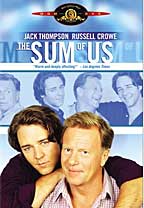
The
Sum Of Us
MGM Video, 1994
Director::
Geoff Burton
Kevin Dowling
Screenplay:
David Stevens,
based on his play
Starring:
Jack Thompson, Russell Crowe, John Polson, Deborah Kennedy, Joss
Moroney, Mitch Matthews, Julie Herbert
Rated R, 100 minutes
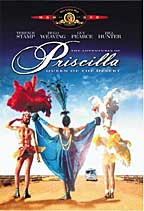
The
Adventures Of Priscilla, Queen Of The Desert
MGM
Video, 1994
Director/Screenplay:
Stephan Elliott
Starring:
Terence Stamp, Hugo Weaving, Guy Pearce, Bill Hunter, Rebel Penfold-Russell,
John Casey
Unrated, 104 minutes
|
Films
From The Land Down Under
by
Michael D. Klemm
Reprinted
from Outcome, June, 2000
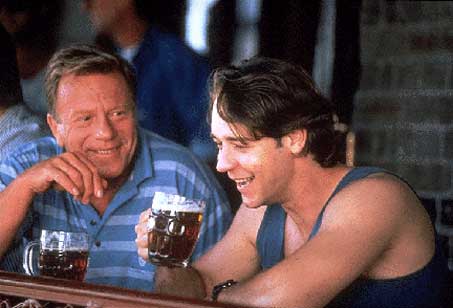
When one thinks about
Australian cinema, visions of Mad Max movies with Mel Gibson usually
come to mind. But filmmakers from the land down under have also made a
few lavender contributions to the annals of world cinema. Back in 1994,
for example, two exceptional Aussie films reached the silver screen:
The Sum Of Us starring Russell Crowe (yes, that
Russell Crowe) and The Adventures of Priscilla,
Queen of The Desert. Both films discarded old and tired
cliches to emerge as true originals.
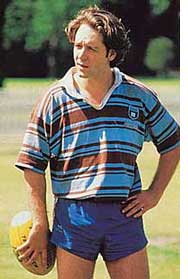 Picture
this scenario: Jeff, a young gay man, brings a date home and they begin
to make out in the living room. In walks Jeff's father. Does the father: Picture
this scenario: Jeff, a young gay man, brings a date home and they begin
to make out in the living room. In walks Jeff's father. Does the father:
a. Explode with anger and begin screaming?
b. Hastily leave the room in embarrassment?
or...
c. Cheerfully offer to get both lads a beer?
The answer, believe
it or not, is "c." The film is The Sum of
Us, adapted by David Stevens from his own play, and directed
by Kevin Dowling and Geoff Burton. Stevens' stageplay, and the resulting
film, are both remarkable for the way in which they jettison the usual
stereotypes to present a healthy relationship between a father and his
gay son in a manner which is both funny and poignant.
|
|
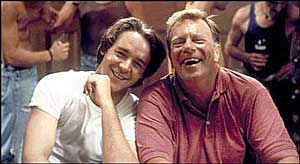 Jack
Thompson is Harry Mitchell, a middle-aged widower who lives with his son
Jeff (Russell Crowe). Jeff is a likable slacker-type who plays football
and works as a plumber. He enjoys a wonderful relationship with his father
in which they are best friends. Harry completely accepts his son's homosexuality
to the point where he even tries to help him find a date! Harry is so
accepting that he actually scares away Greg, the date that his son brings
home, when he cheerfully sticks his head into Jeff's bedroom to ask Greg
how he likes his tea in the morning. Jack
Thompson is Harry Mitchell, a middle-aged widower who lives with his son
Jeff (Russell Crowe). Jeff is a likable slacker-type who plays football
and works as a plumber. He enjoys a wonderful relationship with his father
in which they are best friends. Harry completely accepts his son's homosexuality
to the point where he even tries to help him find a date! Harry is so
accepting that he actually scares away Greg, the date that his son brings
home, when he cheerfully sticks his head into Jeff's bedroom to ask Greg
how he likes his tea in the morning.
Harry's openness
stems in part from his experience with his own mother. Upon being widowed,
his mother found love in the arms of another woman and then lived with
"Aunt" Mary for 40 years until both women became too old and sick to look
after each other. Haunted all his life by their forced separation, Harry
tells the audience that perhaps gayness is hereditary but skipped a generation
with him since he loves women. Because he recognizes the extraordinary
relationship his mother enjoyed with Mary, he has no trouble accepting
the concept of two men in love. The "family values" that he tries to impart
to his son are simply this: love is the greatest adventure, follow your
heart.
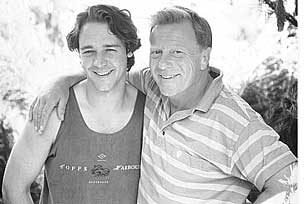 To
parallel Jeff's courtship with Greg, Harry finds love again with a widow
named Joyce who he meets through a computer dating service. All is fine
until homophobia rears its ugly head when she discovers Jeff's lifestyle
and expresses her disgust. To
parallel Jeff's courtship with Greg, Harry finds love again with a widow
named Joyce who he meets through a computer dating service. All is fine
until homophobia rears its ugly head when she discovers Jeff's lifestyle
and expresses her disgust.
Stylistically, the
film breaks down the "fourth wall" by allowing both Harry and Jeff to
talk to the audience. This common stage device is often a disruption in
movies, but it works beautifully here and adds to the film's charm. (These
chats with the audience were what really distinguished the play when I
saw it on stage.) Flashbacks are artfully presented in silence and in
black & white, allowing for a number of events that were only described
onstage to be visualized onscreen. The flashbacks of Grandmother and "Aunt"
Mary are touching, and their separation scene is a heartbreaker.
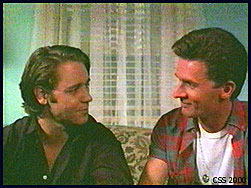 This
is a captivating and remarkably acted film which treats homosexuality
as an everyday fact of life. The Sum of Us
is very funny because audiences are unaccustomed to seeing a father and
son speak so frankly about gay sexual concerns. Perhaps its only concession
to straight audiences was the addition of a few more scenes involving
Harry and Joyce (she only appears once in the stage version). But this
does not compromise the film, nor does a scene involving Joyce and her
daughter which nicely balances the intimacy between Harry and Jeff. Thankfully,
the filmmakers did not add a scene where Joyce tries to fix up
Jeff with her daughter. This
is a captivating and remarkably acted film which treats homosexuality
as an everyday fact of life. The Sum of Us
is very funny because audiences are unaccustomed to seeing a father and
son speak so frankly about gay sexual concerns. Perhaps its only concession
to straight audiences was the addition of a few more scenes involving
Harry and Joyce (she only appears once in the stage version). But this
does not compromise the film, nor does a scene involving Joyce and her
daughter which nicely balances the intimacy between Harry and Jeff. Thankfully,
the filmmakers did not add a scene where Joyce tries to fix up
Jeff with her daughter.
While The
Sum of Us presents a dream father-gay son relationship,
it also allows that this is not the case in all families. Greg is not
out to his parents and doesn't get along with his father. In fact,
it is Harry's unexpected approval of his son's lifestyle that initially
scares Greg away. Joyce is shocked to discover that Jeff is gay, but she
is angrier because Harry never told her. Harry is devastated when she
asks if the reason for his silence is shame when the real reason is that
he is so comfortable with his sonŐs sexuality that he never thought to
bring it up.
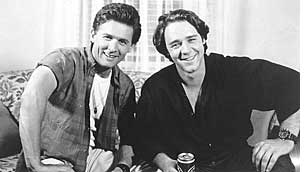 To
the film's credit there are no gay stereotypes. Even the gay bar
scenes aren't loaded with drag queens in the background. Russell Crowe's
portrayal of a gay man is commendable and convincing. As is typical with
Hollywood soundbites, Crowe's role in The
Sum Of Us is rarely, if ever, mentioned. It is always Romper
Stomper, a film in which he played a neo-Nazi, that is brought up
whenever his Aussie film background is discussed. Crowe underplays Jeff
with just the right amount of passion and depth, foreshadowing his later
tour-de-force performances in LA Confidential and The Insider.
And Jack Thompson is a pure delight as his Dad. To
the film's credit there are no gay stereotypes. Even the gay bar
scenes aren't loaded with drag queens in the background. Russell Crowe's
portrayal of a gay man is commendable and convincing. As is typical with
Hollywood soundbites, Crowe's role in The
Sum Of Us is rarely, if ever, mentioned. It is always Romper
Stomper, a film in which he played a neo-Nazi, that is brought up
whenever his Aussie film background is discussed. Crowe underplays Jeff
with just the right amount of passion and depth, foreshadowing his later
tour-de-force performances in LA Confidential and The Insider.
And Jack Thompson is a pure delight as his Dad.
Like much foreign
cinema, The Sum Of Us avoids
Hollywood slickness and the result is a refreshing addition to the growing
list of outstanding gay films. It presents a touching story for our enjoyment
without getting either maudlin or preachy. Theatregoers who saw Richard
Lambert's fine production in The
New Phoenix Theatre On The Park a few years ago will be pleased to
know that The Sum of Us made
the transition to film without any compromises to its integrity. And playing
queer didn't seem to hurt Russell Crowe's career, did it? Highly recommended
to both fans of Russell Crowe and of queer cinema.
|
 |
|
On the campier side
is The Adventures of Priscilla, Queen of the
Desert, directed by Stephen Elliott. This lively and hilarious
story, about three drag queens whose dilapidated bus, Priscilla, breaks
down in the Australian Outback, examines gender bending issues, culture
shocks, homophobia, and how to dress fabulously.
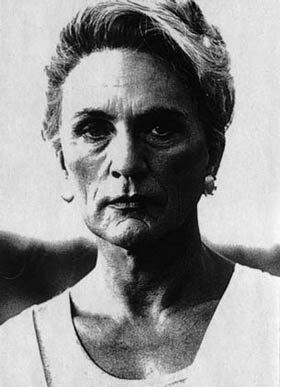 The
casting of this film is unique to say the least. Former international
sex symbol Terrence Stamp stars as a transsexual named Bernadette (nee
Ralph). Hugo Weaving is the sad Mitzi, and Guy Pierce (who, like Russell
Crowe, would also later play a tough cop in LA Confidential) is
Felicia, a handsome and muscular drag queen who is the most flamboyant
of the trio. The
casting of this film is unique to say the least. Former international
sex symbol Terrence Stamp stars as a transsexual named Bernadette (nee
Ralph). Hugo Weaving is the sad Mitzi, and Guy Pierce (who, like Russell
Crowe, would also later play a tough cop in LA Confidential) is
Felicia, a handsome and muscular drag queen who is the most flamboyant
of the trio.
Priscilla
begins with Mitzi and Felicia, in full drag, comically
lip-synching "I've Been to Paradise but I've Never Been to Me" in a bar
while patrons play billiards and throw beer cans at the stage. Looking
for a change of scenery, they accept a four week casino engagement in
Alice Springs, a town in the middle of nowhere. Mitzi calls an old friend,
a pre-op transsexual named Bernadette, who has just suffered the recent
death of her lover. He invites the grieving Bernadette to join them on
the cross-country bus trek from Sidney to Alice Springs. Anticipating
peace and quiet, Bernadette instead has to deal with the ABBA-loving Felicia
who wishes to achieve his lifelong dream: to climb Devil's Canyon in a
full length sequined gown and a tiara. "Just with this country needs,"
quips Bernadette, "A cock in a frock on a rock."
|
|
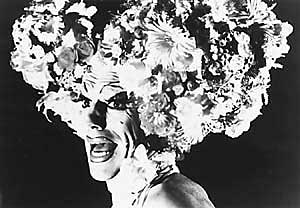 This
is a film that triumphs by setting up audience expectations and then going
off in totally different directions. For example, after assuming that
Bernadette's lover died of AIDS, the viewer learns that he asphyxiated
on peroxide fumes in a bizarre bathroom accident. During the bus trip,
Bernadette and Felicia discover that Mitzi has a wife waiting for
him at their destination. While stopping over in a small town, the trio
dresses up and performs in a local bar. A very nasty woman pushes through
the speechless crowd to announce, "We don't want your kind here," and
then Bernadette and the woman sit down to a riotous drinking contest that
is lifted right from Raiders of the Lost Ark. Later, when their
bus breaks down in the outback, opposites attract when a very rugged mechanic
takes a shine to Bernadette and brings her flowers. This
is a film that triumphs by setting up audience expectations and then going
off in totally different directions. For example, after assuming that
Bernadette's lover died of AIDS, the viewer learns that he asphyxiated
on peroxide fumes in a bizarre bathroom accident. During the bus trip,
Bernadette and Felicia discover that Mitzi has a wife waiting for
him at their destination. While stopping over in a small town, the trio
dresses up and performs in a local bar. A very nasty woman pushes through
the speechless crowd to announce, "We don't want your kind here," and
then Bernadette and the woman sit down to a riotous drinking contest that
is lifted right from Raiders of the Lost Ark. Later, when their
bus breaks down in the outback, opposites attract when a very rugged mechanic
takes a shine to Bernadette and brings her flowers.
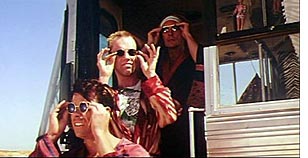 But
this isn't just another non-threatening "let's laugh at the drag queens"
movie like the Spielberg-produced clone, To Wong Foo, Thanks For Everything,
Julie Newmar. The Hollywood version features three principals who
are always in drag, whereas Priscilla's
characters are often more believably seen wearing street clothes. Wong
Foo's characters are also virtually sex-less, making it such a safe
and innocuous film that you could take your Grandmother to it.
Priscilla, on the other hand, has
more to offer than scenes of macho movie stars in drag and often ventures
into dangerous territories. The exuberant drag scenes alternate with moments
of soul searching and even a few flashes of intense homophobia. At one
point, they find the words "AIDS Fuckers Go Home" painted on their bus.
Things turn even uglier when Felicia, stoned on ecstacy, dresses up and
stupidly flirts with some rough men in a mining town who don't take too
kindly to his ruse. But
this isn't just another non-threatening "let's laugh at the drag queens"
movie like the Spielberg-produced clone, To Wong Foo, Thanks For Everything,
Julie Newmar. The Hollywood version features three principals who
are always in drag, whereas Priscilla's
characters are often more believably seen wearing street clothes. Wong
Foo's characters are also virtually sex-less, making it such a safe
and innocuous film that you could take your Grandmother to it.
Priscilla, on the other hand, has
more to offer than scenes of macho movie stars in drag and often ventures
into dangerous territories. The exuberant drag scenes alternate with moments
of soul searching and even a few flashes of intense homophobia. At one
point, they find the words "AIDS Fuckers Go Home" painted on their bus.
Things turn even uglier when Felicia, stoned on ecstacy, dresses up and
stupidly flirts with some rough men in a mining town who don't take too
kindly to his ruse.
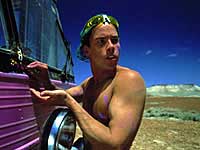 It's
true that many of the laughs rise from familiar "stranger in a strange
land" themes, but the film provides more than just bizarre images like
Bernadette stopping to put on lipstick while lost in the desert or Felicia
riding atop a bus wearing a football field-length train which flaps in
the breeze. Priscilla also
offers three fully developed characters with human needs and frailties.
Hugo Wearing and Guy Pierce create characters who are flamboyant but also
human beneath the glitter. Terrence Stamp's portrayal of Bernadette is
a masterpiece of subtlety, underplaying it rather than coming across as
a shrill Bette Davis having a bad hair day. It's
true that many of the laughs rise from familiar "stranger in a strange
land" themes, but the film provides more than just bizarre images like
Bernadette stopping to put on lipstick while lost in the desert or Felicia
riding atop a bus wearing a football field-length train which flaps in
the breeze. Priscilla also
offers three fully developed characters with human needs and frailties.
Hugo Wearing and Guy Pierce create characters who are flamboyant but also
human beneath the glitter. Terrence Stamp's portrayal of Bernadette is
a masterpiece of subtlety, underplaying it rather than coming across as
a shrill Bette Davis having a bad hair day.
Priscilla
is a great drag comedy whose script offers far more than just outrageous
camp. It's also the only film in history to ever be boycotted by an international
ABBA fan club. Priscilla can
be rented at most chain video stores, but The
Sum of Us might be a little harder to find. Both can, however,
be rented at Rainbow Pride, (located in Buddies, 31 Johnson Park), and
at Mondo Video, 1109 Elmwood Avenue. The three Fassbinder films that were
reviewed in the last issue can also be found at Mondo and Querelle
is also available at Rainbow.
More On Hugo Weaving:
Bedrooms & Hallways
|
|
Reviewer's note,
2007: Interjecting a bit of autobiography and historical context here.
In many of my older reviews there are references to these films being
unavailable at Blockbuster Video. Times have changed, but in the 90s,
that was the case. They were a "family store." Blockbuster's
policy back then (since changed) of not carrying NC-17 or unrated films
forced many filmmakers to emasculate their films to get an R rating
so Blockbuster "the family store" would carry it. .I usually reported
if the films were available for rent at Buffalo's two funkiest video
stores - Mondo Video, which was owned by the film critic from Artvoice
Magazine, M. Faust, and was the place to go to get the hard
to find titles - and Rainbow Pride, a gay gift shop run by Frank Ball;
he also rented videos. For years, his store was the front room in a
popular gay bar, Buddies.
Anyway, when I
wrote this review you could not find titles like these at Blockbuster.
And I often ranted about it. I've left them in these reviews as I put
them online because they are a kind of time capsule. Because early in
the millennium there was a changing of the guard at Blockbuster. You
could rent Queer as Folk there now! Their
old policy of no gay films and no unrated films was gone, finished.
And that was good news for filmmakers and film lovers everywhere. I
even ended one of my columns with a public service announcement that
Blockbuster changed its policies and now carried gay films. I'm not
being coerced into writing this, I'm just being fair because that was
a big turnaround. Of course it was also around the time I discovered
netflix.com and saw that I could rent almost anything from them.
Foreign films, independents and of course queer cinema. This note is
just to explain how times have changed (for the better) and it is much
easier to find queer titles now, whether for rent or for sale. The internet
of course got us out of the dark ages too.
|


